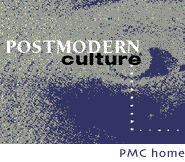
Abstracts
Volume 15, Number 1September, 2004
- Abstract: While Deleuze is frequently critical of the spatialization of time, such that one of duration's effects--man--produces a homogenized and metric time, he is also concerned with the ways in which spatial milieux allow for the thought of time in general. Certain affects and images, including the face of Western man, create transcendent planes that organize life from a single point of view, but the thought of affect as such also allows for the intuition of the plane of immanence--the spatial lines emanating from one enduring life. --cc
- Abstract: This article contributes to emerging theories of affect (following recent work by Brian Massumi, Steven Shaviro, and others) by outlining a critical vocabulary that approaches culture in its affective dimensions, beyond existing cultural vocabularies of signification. Such an affective vocabulary makes it possible to account for social and political effects that are conducted through non-qualified and non-signifying operations. Taking the body as a site of affect's operation in culture, this article suggests that we should read certain political body-sites across the affective terms of intensity, relationality, and a Deleuzoguattarian sense of the event. Citing the specific illustration of George W. Bush's infamous malapropisms, the author argues that we cannot fully understand the effects of political and cultural bodies if our readings proceed only along the plane of signification. This article thus offers a double gesture of affective analysis. First, it generates an affective vocabulary via the spectacle of Bush's decomposing body. It then reads this body across a developing vocabulary of affect. --jhe
- Abstract: This paper argues against a transcendental version of postmodern virtuality, with its desire to achieve escape velocity, by showing that a major feature of postmodern culture is in fact realism, a brand of realism that is concerned with the archaic, the natural, the pristine and unspoiled. The roots of realism are briefly charted in order to show the continuity and reformatting of realism within postmodern virtual culture in the form of reality TV, with Survivor and more reflexive films dealing with reality and virtuality as the primary exemplars. Realism's premise of mimesis and authenticity has evidently survived in postmodern culture, and as ever functions as ideological camouflage, despite being rigorously questioned in more reflexive postmodernisms. This suggests not so much the enduring utility of materialist critiques, but that virtual culture cannot float free of the physical, let alone the generic, that the acculturation of the archaic is likely to increase in the future, and that realism is unlikely to disappear. --gg
- Abstract: This article attempts to track the reception of Foucault within cultural studies and examines the difficulties involved in mobilizing Foucault's ideas within the field as it exists in its current orthodoxies. The theoretical and methodological problems that arise when deploying Foucault's ideas turn largely on cultural studies' conceptualizations of power, subjectivity, and discourse, and reveal a dialectic between structure and agency that appears to define and constrain cultural studies' critical agenda. The article surveys some of the ways in which the investigative possibilities raised by Foucault's work have been put to use within cultural studies--including figures such as Stuart Hall, Judith Butler, Tony Bennett, and Ian Hunter. It is argued that the tenets of cultural studies' criticality manifest themselves as a series of ongoing, irresolvable tensions. Following Hunter, it is contended that these dilemmas are imbricated with a more profound opposition that is central to the formation of the modern subject. It is, however, also a certain reading of Foucault that opens up a less burdened space of analysis--providing the tools for generating an alternative pragmatics that enables tangible interventions into specific historical problems. --rk
Claire Colebrook, The Sense of Space: On the Specificity of Affect in Deleuze and Guattari
Jenny H. Edbauer, Executive Overspill: Affective Bodies, Intensity, and Bush-in-Relation
Gerald Gaylard, Postmodern Archaic: The Return of the Real in Digital Virtuality
Rimi Khan, Reading Cultural Studies, Reading Foucault
Copyright (c) 2004, 2003, 2002, 2001, 2000, 1999, 1998, 1997, 1996, 1995, 1994, 1993, 1992, 1991, 1990 Postmodern Culture & the Johns Hopkins University Press. CONTENTS OF THIS ISSUE ARE AVAILABLE FREE OF CHARGE UNTIL RELEASE OF THE NEXT ISSUE. A TEXT-ONLY ARCHIVE OF THE JOURNAL IS ALSO AVAILABLE FREE OF CHARGE. FOR FULL HYPERTEXT ACCESS TO BACK ISSUES, SEARCH UTILITIES, AND OTHER VALUABLE FEATURES, YOU OR YOUR INSTITUTION MAY SUBSCRIBE TO PROJECT MUSE, THE ON-LINE JOURNALS PROJECT OF THE JOHNS HOPKINS UNIVERSITY PRESS.
